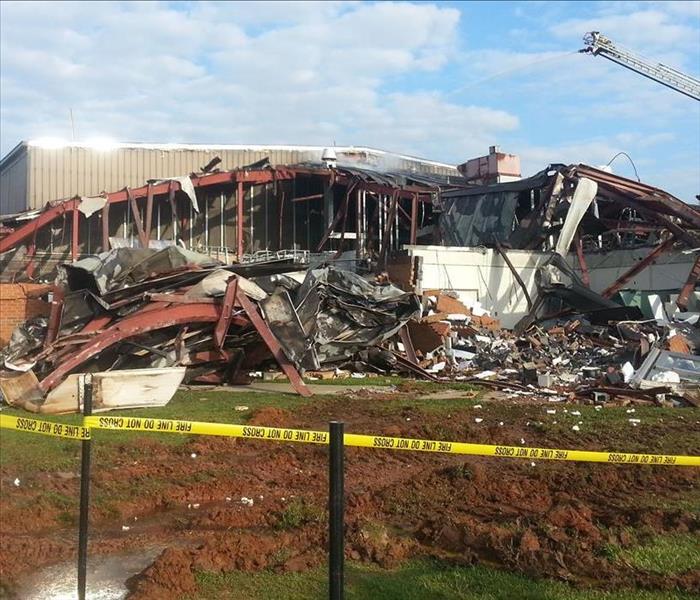After the Fire: What to Do to Help Your Business Recover
7/26/2021 (Permalink)
 SERVPRO of Paulding/Polk Counties is your local expert to help make sure your business reopens following a fire.
SERVPRO of Paulding/Polk Counties is your local expert to help make sure your business reopens following a fire.
Although many of us go through great efforts to fireproof our home, we rarely bring this outlook into the workplace. While there’s no replacement for a little bit of forethought and diligence, a fire at your place of business doesn’t have to mean the end of your company altogether. In fact, approximately 60 percent of all U.S.-based businesses reopen their doors after a disastrous fire. Some companies have even gone on to achieve a great amount of success and profitability after such an event. Here are some tips to make sure yours is one of them.
Determine the Responsible Party
The first thing you should do in the wake of a fire at your business is determine the responsible party. This depends on a number of different factors, including whether you lease or own the building, the exact cause of the fire and even your specific amount of insurance coverage. Keep in mind that some insurance policies only cover the contents of the structure and not the materials used in the actual construction of the building.
Sometimes, you may need to wait until an investigation has been completed by your local fire department, police department or insurance company. If this is the case, make sure to maintain communications for further information and instructions.
Safeguard and Secure Your Remaining Property
If the fire has caused significant damage to the exterior walls, doors, windows or roof of your building, you’ll want to act quickly in order to safeguard and secure your remaining property. Smoldering remains should be fully extinguished and any large holes should be temporarily patched. Not only will this prevent vandalism after the fact, but a little bit of effort can go a long way towards minimizing the overall amount of damage caused.
Contact Anyone Who May Be Affected
Next comes the daunting task of contacting anyone who may have been affected as a result of the fire. This includes employees, board members, external partners and, in some cases, customers. If any activities or services need to be postponed or suspended, make sure to communicate that news, too. The last thing you want to do after a fire is to leave your valuable employees and business partners in the dark about the future of your company.
Furthermore, don’t forget to contact your insurance agent as soon as possible. A simple call or email will typically suffice, though large claims may require face-to-face consultation or even an on-site inspection of the damaged property.
Get Your Documentation in Order
Your insurance company will require proof regarding any claimed losses as a result of the fire, so be sure to have any pertinent documentation, including receipts, user manuals and credit card statements, at the ready. You may even want to take digital pictures or video of your property. Not only can this be used in determining your overall losses, it could serve as hard evidence in case any court proceedings should follow.
Repair and Restore Damage
If the structure isn’t a total loss, you might be able to rebuild, repair and restore your business back to its original state. Extensive smoke damage, for example, can typically be cleaned up through a number of different tools so you can go on with business as usual after the restoration.
Initiate the Recovery of Sensitive or Critical Data
Depending on your exact case, you may need to take steps to recover any sensitive or critical data that was lost in the occurrence. Damaged servers, hard drives and even personal computers can all hold data critical to the day-to-day operations of your business.
If the situation warrants, you may even consider hiring a third-party that specializes in data recovery and restoration, specifically in the event of fire. Such individuals are more likely to be equipped with the right hardware and software tools than a company that offers general disaster recovery services. Most data recovery experts will also be able to work with you in order to introduce techniques in disaster recovery planning and data loss prevention.
Getting Back to Business
Once everything has been restored to order, it’s finally time to get back to business. Make sure to outline a comprehensive fire safety plan when moving forward, just in case your business experiences another fire. You might also consider increasing your insurance coverage for the future. After all, it is better to be safe than sorry.




 24/7 Emergency Service
24/7 Emergency Service